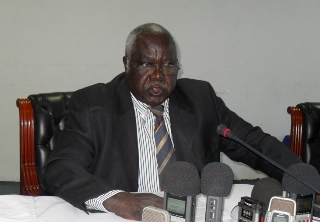Reveal list most corrupt officials, ex-minister dares S. Sudan speaker
February 09, 2012 (JUBA) – A former minister for Finance and Economic Planning in South Sudan has requested the national assembly speaker make public a list, supposedly handed to President Salva Kiir on a visit to the US, allegedly detailing the “most corrupt” officials in the Juba government.

The speaker, according to Chol, reportedly told lawmakers that the officials named are alleged to have stolen millions of dollars and hidden it in banks outside the country – one of the poorest in world.
“Go and ask the speaker who told MPs of the 13 most corrupt officials. He has the list and it’s high time he made them known to the public,” he said.
“Those implicated should tell the public how they obtained all that money.”
2005-2007 AUDIT
Chol, who served as finance minister from 2005-2007, also lauded last year’s auditor general’s report, which was presented in the national assembly. The document revealed how billions of dollars, mainly from oil revenues, went unaccounted for during the first two years of the interim period.
During the 2005-2006 financial years, for instance, over $1 billion is unaccounted for in transfers of oil revenues from the Government of National Unity – the power and wealth sharing partnership in Khartoum created by 2005 peace deal – to the autonomous Government of South Sudan (GoSS) in Juba.
In addition, the auditor general’s report further indicated that for two consecutive years, there was no financial reporting of what happened to non-oil revenues that were collected in taxes by the national government or South Sudan’s 10 states.
The ex-finance minister, who looked composed during the press briefing commended the auditor general’s report, but said “sufficient attention” was not given to these discoveries.
He remarked, “I am of the opinion that the auditor general should instruct his auditors to do a full audit and discovery on the national bank, and I am sure if they do this in a diligent and transparent manner, they will find the missing links [which] are there, but not yet discovered.”
Chol said that in 2006 some individuals from within South Sudan’s ruling party accused him of stealing public funds. An investigation by the Sudan People’s Liberation Movement (SPLM) caucus found him to be innocent, he said.
According to the former minister, he was only involved in making approvals after instructions were issued from “above” concerning government spending.
OIL DISPUTE RESOLUTION
Chol, a holder of masters in economics from Switzerland, expressed concern over the ongoing oil crisis following the nationwide shutdown oil production as part of a dispute with Khartoum over transit fees.
According to Chol, while serving as finance minister, he advised the government to concentrate more on collecting taxes from customs to avoid over-dependency on oil revenues, which constitutes 98% of South Sudan’s budget.
“My advice was largely ignored,” he said. “Now see where the country is headed in light of the current oil crisis,” he said, urging the southern government amicably resolve the ongoing dispute with the Khartoum regime.
So far African Union led negotiations have failed to bring the two sides together. Juba wants to pay around $1 per barrel exported through northern pipelines and refineries, whereas Khartoum wants to be paid over $32 per a barrel.
North Sudan also claims the South owes $1 billion in unpaid fees and began to appropriate southern crude as payment in kind, triggering Juba’s decisive move.
(ST)
